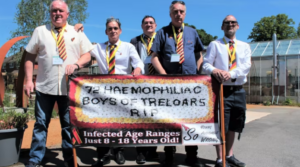“The Infected Blood Scandal: Who Is Responsible for the NHS’s Devastating ‘Treatment Disaster’?”_l

The lives of more than 30,000 people in the UK were upended after they were infected with diseases linked to contaminated blood products during the 1970s and 1980s.
The diseases – Hepatitis C and HIV – resulted in the deaths of around 3,000 patients – 380 of which were children.
Earlier this year, a seven-year public inquiry published its final report, which it said will provide a measure of justice to the thousands of people affected in what has been called the “biggest treatment disaster in NHS history”.
According to the report, the patients had been failed “not once, but repeatedly” by doctors, the government, the NHS, and others.
On Friday the government announced victims of the scandal will receive compensation for life.
The government did not say how much they expect the scheme to cost but awards for those at the top end are likely to exceed £2.5 million.
ITV News outlines who exactly was responsible for the disaster, and whether or not they will face consequences.

NHS and doctors
The risks of blood and blood products causing severe infection were “known well before most patients were treated,” the report found.
Yet, patients were not informed of the risks or the alternatives, with a culture of “doctor knows best” prevailing among the ranks of the NHS.
In some cases, patients were not even told they had been infected, whilst others were informed, but in ways that were “insensitive and inappropriate,” the report found.
Haematologists of the era have been also heavily criticised, including leading haematologist, Professor Arthur Bloom, whose opinions “disastrously” influenced the UK Department for Health and Social Security (DHSS), the report said.
According to the report, Prof Bloom failed to pass on warnings and advised to continue importing commercial factor concentrates.
Sir Brian Langstaff, inquiry chair, said Prof Bloom – who died in 1992 – “must bear some of the responsibility for the UK’s slowness in responding to the risks of Aids to people with haemophilia”.
At the time, Prof Bloom said he was unaware of any proven case in the UK and that there was no need to change treatment.

Treloar College
Some of the worst mistakes of the scandal were made at Lord Mayor Treloar College, in Alton, Hampshire, between the 1970s and 1980s.
Several of the male pupils who attended the boarding school at the time were given treatment for haemophilia at an on-site NHS centre while receiving their education.
It was later found that many pupils with the condition had been treated with plasma blood products which were infected with Hepatitis C and HIV. More than half of the students treated are now dead.
School administrators were not blamed in the report, but NHS clinicians who treated boarding school pupils on the grounds were.
According to the inquiry, the clinicians were “well aware” of the risks of infecting the children, which it says were regarded as “objects of research”.
A statement released by the college on Monday said the inquiry “lays bare the systemic failure at the heart of the scandal”.
The statement continued: “Whilst today is about understanding how and why people were given infected blood products in the 1970s and 80s, it is absolutely right that the government has committed to establishing a proper compensation scheme.
“We’ll now be taking the time to reflect on the report’s wider recommendations.”
Des Collins, a lawyer who is representing the 1,500 clients from the college called for a criminal prosecution, and said his clients had been “waiting a long time” for justice.
“They don’t have it in them to wait any longer,” he added.
Victims who attended the college were awarded a bonus £15,000 in compensation on top of what they were already entitled to.



